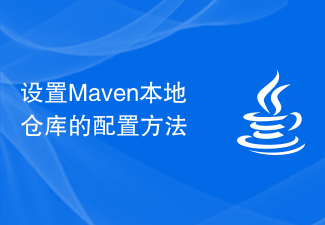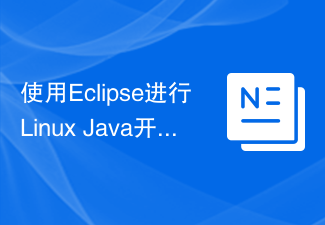 Operation and Maintenance
Operation and Maintenance Linux Operation and Maintenance
Linux Operation and Maintenance Basic configuration guide for Embedded Linux graphical interface development using QtCreator
Basic configuration guide for Embedded Linux graphical interface development using QtCreatorBasic Configuration Guide for Embedded Linux Graphical Interface Development using QtCreator
With the popularity of embedded Linux systems, more and more developers are paying attention to how to implement graphical interfaces on embedded devices. QtCreator is a powerful tool that can help developers develop beautiful, easy-to-use graphical interfaces in embedded systems. This article will provide a basic configuration guide for using QtCreator for Embedded Linux graphical interface development, with code examples attached.
Step 1: Install QtCreator
First, you need to install QtCreator on your development machine. You can download the installer from the Qt official website and follow the prompts to install it.
Step 2: Configure the cross-compilation tool chain
In embedded Linux development, you need to use a cross-compilation tool chain to generate binaries that can run on the target device. You can contact the vendor of your device to obtain a cross-compilation toolchain and configure it as QtCreator's compilation tool.
In QtCreator, open the "Tools->Options->Build&Run->Suites" tab. Click the "Add" button and select "GCC". Enter the name of the package you wish to display in the "Name" field and select the path to the cross-compilation toolchain you downloaded. Click the "Apply" button to save the configuration.
Step 3: Create a new project
In QtCreator, click "File"->"New File or Project" and select "Application". In the Project wizard, select Qt Widgets Application.
In "Device Type", select "Device" and click the "Continue" button.
In "Cross-compilation configuration", select the cross-compilation tool chain suite you configured previously, and click the "Continue" button.
Enter your project name in "Project Name" and select the path where the project is located. Then click the "Continue" button.
In "Class Information", you can select the required class according to your needs and click the "Finish" button.
Step 4: Write code
Next, you can write your code in QtCreator's editor.
In the left panel of QtCreator, you can find the project file list. You need to open the source file of the main window and write your code in it. Here is a simple example:
#include <QApplication>
#include <QLabel>
int main(int argc, char *argv[])
{
QApplication app(argc, argv);
QLabel label("Hello, QtCreator!");
label.show();
return app.exec();
}Step 5: Build and Deploy
In the left panel of QtCreator, select your project files list. Click "Build->Build Project". This will generate the executable file for your application.
Then, you need to deploy the generated executable file to the target device. You can SSH to the target device and copy the executable file to the device. Run your application and observe whether it runs on the device.
Summary
This article provides a basic configuration guide for using QtCreator for Embedded Linux graphical interface development, and provides code examples. By following these steps, you can start developing beautiful, easy-to-use GUI applications. I hope this article is helpful to you, and I wish you success in completing your embedded Linux graphical interface development project!
Reference materials:
- QtCreator documentation: https://doc.qt.io/qtcreator/
- Embedded Linux graphic development guide: http://embeddedfreak .wordpress.com/
The above is the detailed content of Basic configuration guide for Embedded Linux graphical interface development using QtCreator. For more information, please follow other related articles on the PHP Chinese website!
 简单易懂的PyCharm环境变量配置指南Feb 21, 2024 pm 03:03 PM
简单易懂的PyCharm环境变量配置指南Feb 21, 2024 pm 03:03 PMPyCharm是一款功能强大的Python集成开发环境(IDE),它提供了丰富的功能和工具,可以帮助开发者提高工作效率。在PyCharm中,可以通过配置环境变量来方便地管理项目中的配置信息,本文将为大家介绍如何在PyCharm中进行环境变量的配置,希望对初学者和开发者有所帮助。一、在PyCharm中配置环境变量的步骤如下:打开你的PyCharm项目,在项目面
 实现网站高可用性的Webman配置指南Aug 12, 2023 pm 01:37 PM
实现网站高可用性的Webman配置指南Aug 12, 2023 pm 01:37 PM实现网站高可用性的Webman配置指南引言:在当今数字化时代,网站已经成为企业重要的商业渠道之一。为保障企业的业务连续性和用户体验,确保网站始终可用性,高可用性已经成为一个核心需求。Webman是一个强大的Web服务器管理工具,它提供了一系列配置选项和功能,能够帮助我们实现高可用性的网站架构。本文将介绍一些Webman的配置指南和代码示例,帮助您实现网站的高
 设置Maven本地仓库的配置方法Jan 05, 2024 pm 03:17 PM
设置Maven本地仓库的配置方法Jan 05, 2024 pm 03:17 PMMaven本地仓库配置指南引言:Maven是一款强大的项目管理工具,用于构建、管理和发布Java项目。其中,本地仓库是Maven的核心组件之一,用于存储项目依赖的第三方库和插件。本文将提供一个针对Maven本地仓库的配置指南,并附上具体的代码示例,以帮助读者更好地理解和应用。一、Maven本地仓库介绍Maven本地仓库是项目存储依赖的本地目录,它保存了项目中
 在Linux系统上使用QtCreator进行嵌入式开发的配置方法Jul 09, 2023 am 11:18 AM
在Linux系统上使用QtCreator进行嵌入式开发的配置方法Jul 09, 2023 am 11:18 AM在Linux系统上使用QtCreator进行嵌入式开发的配置方法引言:嵌入式系统的开发需要一个强大的集成开发环境(IDE),以便于编写、调试和部署应用程序。QtCreator是一款非常流行的跨平台IDE,它提供了丰富的功能和工具,使得嵌入式开发更加高效。本文将介绍在Linux系统上使用QtCreator进行嵌入式开发的配置方法,并提供一些代码示例。一、
 使用IntelliJ IDEA进行Embedded Linux开发的基本配置指南Jul 04, 2023 pm 03:53 PM
使用IntelliJ IDEA进行Embedded Linux开发的基本配置指南Jul 04, 2023 pm 03:53 PM使用IntelliJIDEA进行EmbeddedLinux开发的基本配置指南导言:IntelliJIDEA是一款功能强大的集成开发环境(IDE),在开发嵌入式Linux项目时,它可以提供便捷的编码、调试和部署工具。本文将介绍如何在IntelliJIDEA中进行EmbeddedLinux开发的基本配置。步骤一:安装IntelliJIDEA首先,您需
 使用IntelliJ IDEA进行Linux Java开发的基本配置指南Jul 04, 2023 am 10:10 AM
使用IntelliJ IDEA进行Linux Java开发的基本配置指南Jul 04, 2023 am 10:10 AM使用IntelliJIDEA进行LinuxJava开发的基本配置指南引言:IntelliJIDEA是一款流行的Java集成开发环境(IDE),其强大的功能和友好的用户界面使得开发人员可以更加高效地编写和调试Java代码。本文将介绍如何在Linux操作系统下进行IntelliJIDEA的基本配置,以便开发Java项目。一、安装IntelliJIDEA
 使用QtCreator进行Embedded Linux图形界面开发的基本配置指南Jul 05, 2023 pm 04:30 PM
使用QtCreator进行Embedded Linux图形界面开发的基本配置指南Jul 05, 2023 pm 04:30 PM使用QtCreator进行EmbeddedLinux图形界面开发的基本配置指南随着嵌入式Linux系统的普及,越来越多的开发人员开始关注如何在嵌入式设备上实现图形界面。QtCreator是一种强大的工具,可以帮助开发人员在嵌入式系统中开发出漂亮、易用的图形界面。本文将提供使用QtCreator进行EmbeddedLinux图形界面开发的基本配置指南,并附
 使用Eclipse进行Linux Java开发的基本配置指南Jul 04, 2023 pm 01:07 PM
使用Eclipse进行Linux Java开发的基本配置指南Jul 04, 2023 pm 01:07 PM使用Eclipse进行LinuxJava开发的基本配置指南引言:Eclipse是广泛用于Java开发的集成开发环境(IDE),提供了许多方便的功能和工具。在Linux操作系统上使用Eclipse进行Java开发,可以使开发过程更加高效。本文将介绍如何在Linux上配置Eclipse,以便顺利进行Java开发。步骤一:安装Ecl


Hot AI Tools

Undresser.AI Undress
AI-powered app for creating realistic nude photos

AI Clothes Remover
Online AI tool for removing clothes from photos.

Undress AI Tool
Undress images for free

Clothoff.io
AI clothes remover

AI Hentai Generator
Generate AI Hentai for free.

Hot Article

Hot Tools

ZendStudio 13.5.1 Mac
Powerful PHP integrated development environment

SAP NetWeaver Server Adapter for Eclipse
Integrate Eclipse with SAP NetWeaver application server.

EditPlus Chinese cracked version
Small size, syntax highlighting, does not support code prompt function

DVWA
Damn Vulnerable Web App (DVWA) is a PHP/MySQL web application that is very vulnerable. Its main goals are to be an aid for security professionals to test their skills and tools in a legal environment, to help web developers better understand the process of securing web applications, and to help teachers/students teach/learn in a classroom environment Web application security. The goal of DVWA is to practice some of the most common web vulnerabilities through a simple and straightforward interface, with varying degrees of difficulty. Please note that this software

Atom editor mac version download
The most popular open source editor





